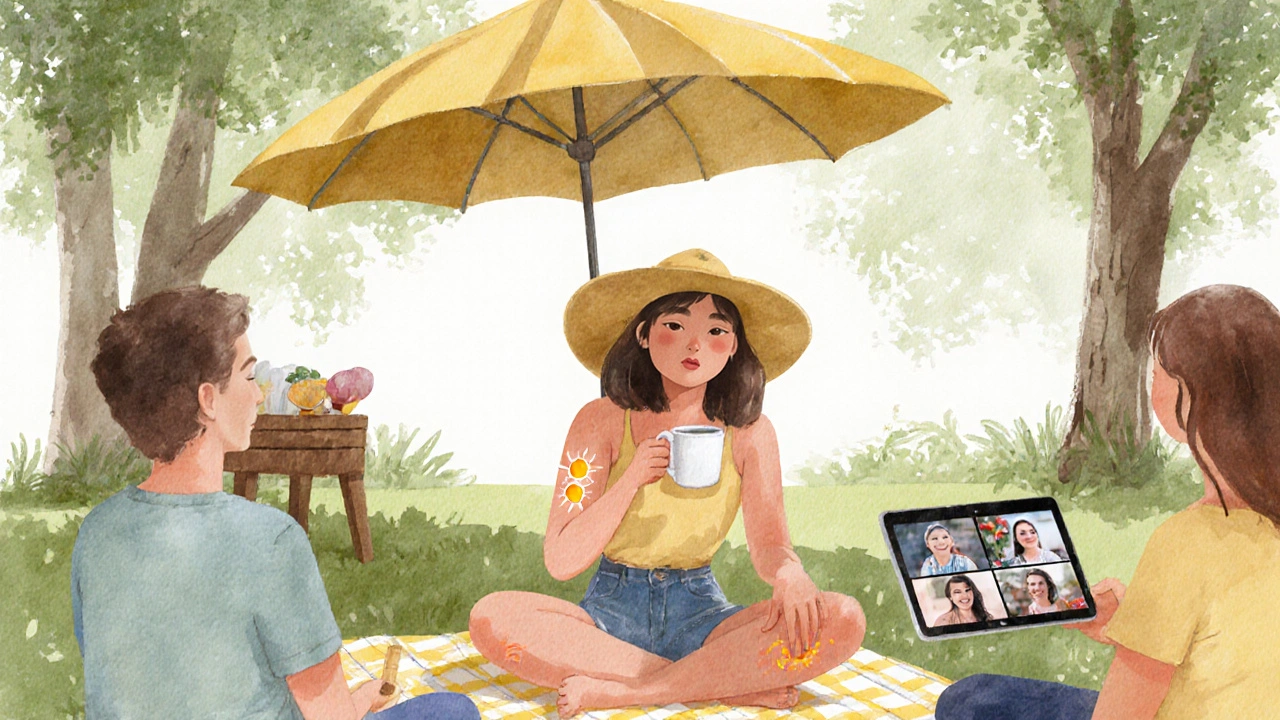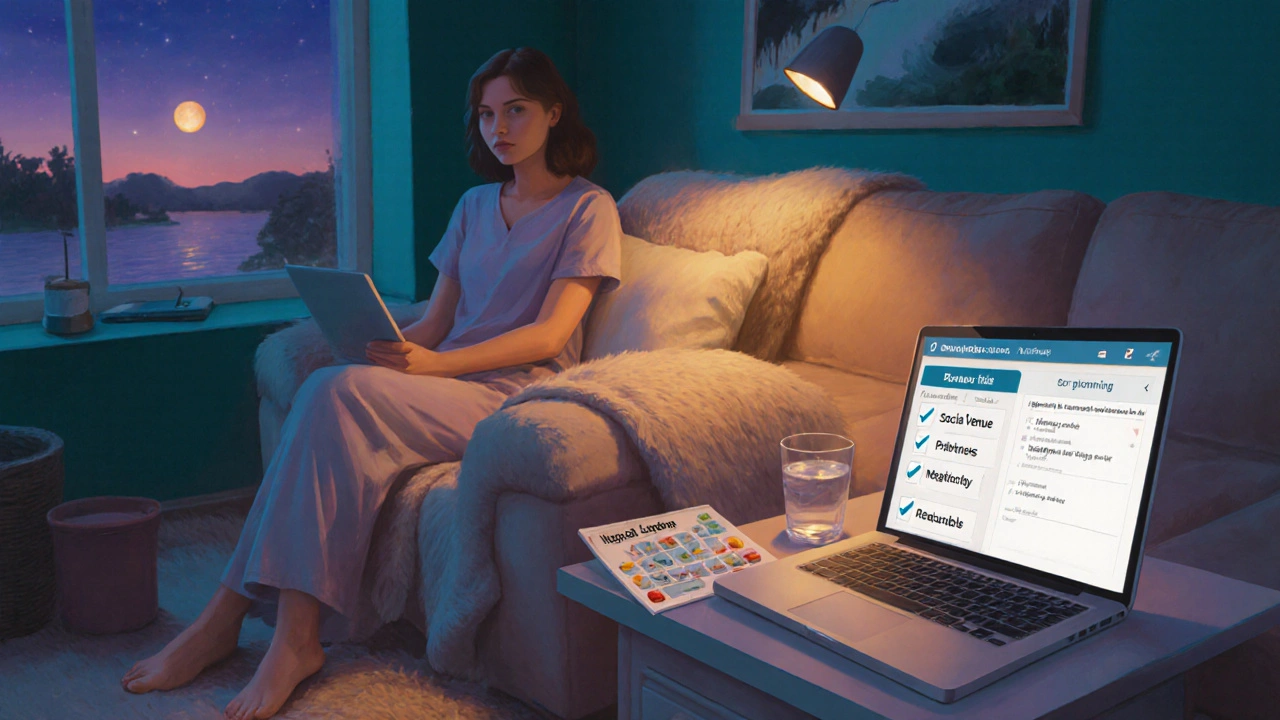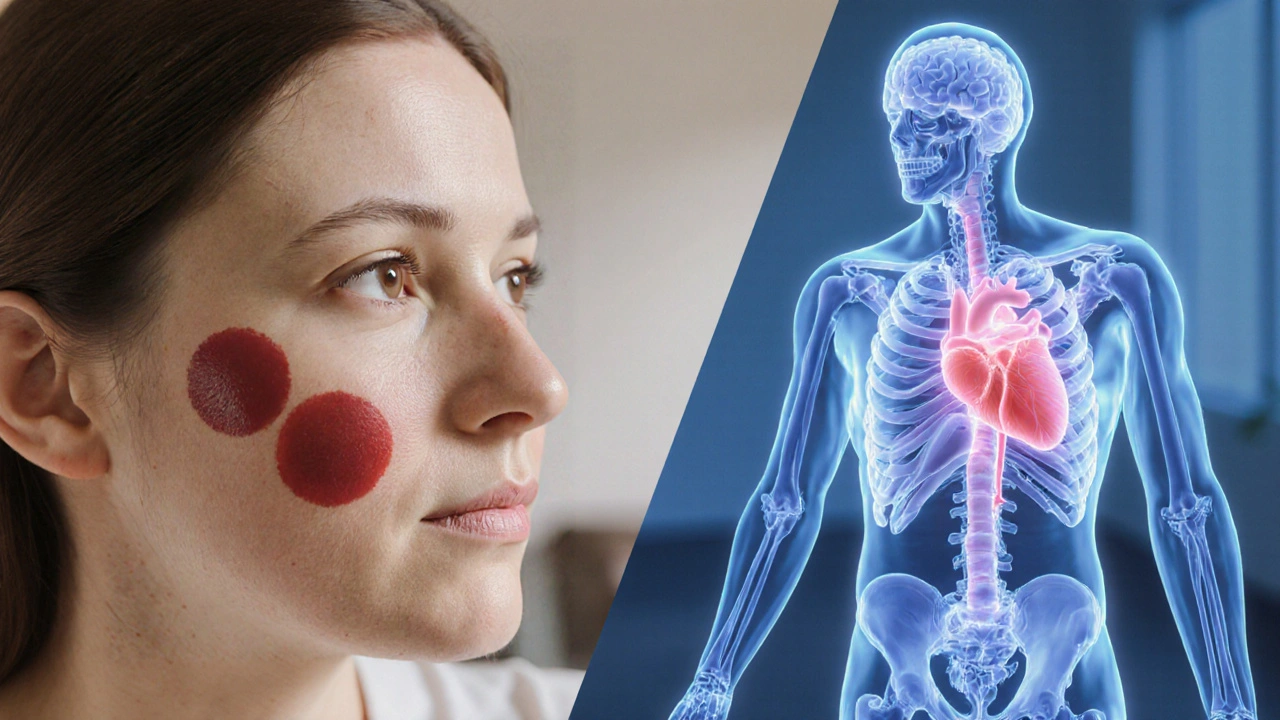Lupus Social Life Planner
Living with lupus is a daily balancing act, especially when you try to keep friendships, dates, and family gatherings fun. Whether you have Discoid Lupus Erythematosus (skin‑focused) or Systemic Lupus Erythematosus (body‑wide), the disease can throw curveballs like fatigue, pain, and photosensitivity. The good news? With a few practical habits you can protect your social life while still managing flare‑ups.
Know Your Lupus Types and How They Affect You
First, understand the basics. Discoid Lupus Erythematosus (DLE) shows up as red, disc‑shaped patches on the skin, often on the face or scalp. It rarely attacks internal organs but can leave permanent scarring. Systemic Lupus Erythematosus (SLE), on the other hand, is a chronic autoimmune disease that can involve the kidneys, heart, joints, and brain. Both types share triggers like sunlight, stress, and infections.
Identify the Biggest Social‑Life Roadblocks
- Fatigue: Lupus‑related tiredness can make long outings feel impossible.
- Photosensitivity: Sun exposure may flare skin lesions or trigger a systemic flare.
- Medication side effects: Steroids, antimalarials, or immunosuppressives can cause mood swings or weight changes.
- Emotional ups and downs: Anxiety about being a “burden” can lead to social withdrawal.
Spotting these early lets you plan ahead instead of scrambling mid‑event.
Practical Strategies to Keep Friendships Thriving
- Schedule social time during low‑energy periods. Most people feel a dip after lunch-use that window for coffee dates or video calls that don’t require a lot of stamina.
- Be transparent, but keep it brief. A simple, “I’m on a lupus flare, so I’ll need to rest early,” tells friends you care without turning the conversation into a medical lecture.
- Choose venues that respect your triggers. Outdoor picnics in the shade, indoor brunches with dim lighting, or early‑evening walks avoid peak UV exposure.
- Leverage technology. Group chats, virtual game nights, or streaming movies together let you stay connected when leaving the house is too taxing.
- Build a support group network-online or in‑person-so you have a backup crew that truly gets the lupus roller coaster.

Medication Management That Won’t Sabotage Your Plans
Most lupus regimens involve immunosuppressive medication like mycophenolate, azathioprine, or low‑dose steroids. These drugs can cause stomach upset or insomnia, which may interfere with social events.
- Take meds with food whenever possible to minimize nausea.
- Set alarms for dosing times; a missed dose can trigger a flare that forces you to cancel plans.
- Discuss timing with your rheumatologist-sometimes shifting a dose earlier in the day reduces nighttime fatigue.
When friends ask why you’re taking pills, a short “It helps keep my immune system from overreacting” is enough.
Nutrition and Lifestyle Hacks That Boost Energy
Eating a balanced diet isn’t just good for general health; it directly impacts lupus fatigue. Aim for:
- Omega‑3‑rich foods (salmon, walnuts) that may lower inflammation.
- Vitamin D supplementation-many lupus patients are deficient and low levels worsen fatigue.
- Hydration-dehydration can amplify joint pain.
- Gentle exercise like yoga or short walks, which improve mood and circulation without overtaxing joints.
When you feel energized, you’ll notice a natural increase in your willingness to join group activities.
Comparison: Discoid vs. Systemic Lupus - What That Means for Social Planning
| Aspect | Discoid Lupus Erythematosus | Systemic Lupus Erythematosus |
|---|---|---|
| Primary organ involvement | Skin (disc‑shaped lesions) | Multiple organs (kidneys, heart, joints, brain) |
| Typical flare triggers | Sunlight, stress | Sunlight, infections, hormonal changes |
| Prevalence | ~5% of lupus cases | ~95% of lupus cases |
| Common medication | Topical steroids, antimalarials | Systemic steroids, immunosuppressives |
| Impact on social events | Photosensitivity is the main concern | Fatigue and organ‑related symptoms dominate |
Knowing these nuances helps you decide whether a beach party or a late‑night dinner is the smarter choice for you that week.

Checklists for a Stress‑Free Social Calendar
- Before the event: Verify location (shade?, indoor?, air‑conditioned?).
- Medication prep: Pack pills, water bottle, and a small snack.
- Energy guard: Set a “leave by” time based on how you feel that day.
- Communication: Send a brief heads‑up to the host about any accommodations you need.
- Post‑event recovery: Schedule a 20‑minute rest period and hydrate.
When Social Life Feels Overwhelming: Signs It’s Time to Pause
If you notice any of these red flags, give yourself permission to step back:
- Persistent joint pain that worsens after social activities.
- New rash or flare‑up after sun exposure.
- Sudden mood swings or anxiety that linger for days.
Consult your rheumatologist promptly-sometimes a medication tweak can restore balance.
Frequently Asked Questions
Can I still travel with lupus?
Yes, but plan ahead. Choose destinations with good medical facilities, bring a doctor’s note, pack enough medication, and use sunscreen or UV‑protective clothing if you’re prone to photosensitivity.
How do I explain lupus to new friends?
Keep it simple: “I have an autoimmune condition that sometimes makes me tired or sensitive to sunlight. I manage it with medication, so I’m usually fine.” This invites empathy without overwhelming detail.
Are there specific foods I should avoid?
Highly processed foods and excess sugar can fuel inflammation. Focus on whole grains, lean proteins, and plenty of fruits and vegetables. Discuss any major diet changes with your doctor.
What if I miss a social event because of a flare?
Send a quick apology and suggest an alternative plan (e.g., a video call). Most friends appreciate honesty and will understand that health comes first.
Is joining a lupus support group worthwhile?
Definitely. Peer support offers practical tips, emotional encouragement, and sometimes even event ideas that work well for people managing similar symptoms.


nathaniel stewart
October 6, 2025 AT 12:56Dear community, the points raised in this guide are indeed commendable.
I would like to emphasize the importance of structured planning, especially regarding medication timing and sun protection.
By adhering to a daily checklist, patients can reduce unexpected flare‑ups and maintain social engagements.
It is advisable to inform hosts ahead of time about any required accommodations, which fosters understanding and inclusivity.
Furthermore, consistent hydration and balanced nutrition act as a cornerstone for energy management.
In my experience, integrating short, low‑impact walks into one's routine can markedly improve stamina without provoking joint pain.
Lastly, remember that optimism combined with disciplined self‑care yields sustainable social participation.
Pathan Jahidkhan
October 13, 2025 AT 11:46Life is a stage, lupus merely a prop that tests our resolve and will to dance.
When the sun blazes, we must seek shade, not surrender.
When fatigue sits heavy, we learn the art of pause.
Thus the simple act of planning becomes a rebellion against the disease.
Dustin Hardage
October 19, 2025 AT 20:32From a clinical perspective, aligning social activities with the patient's circadian rhythm optimizes energy availability.
Schedule gatherings during the individual's peak alertness window, typically mid‑morning for most lupus patients.
Incorporate sunscreen with SPF 30+ and protective clothing as non‑negotiable pre‑event steps.
Maintain medication adherence by setting electronic reminders synced with the activity start time.
These measures collectively mitigate flare risk while preserving social interaction.
Dawson Turcott
October 26, 2025 AT 12:39Wow, so much for a simple brunch, huh?
Alex Jhonson
November 2, 2025 AT 08:32Hey folks, let’s remember that every individual’s trigger map looks different, so a one‑size‑fits‑all plan rarely works.
Encourage friends to ask about specific needs rather than assuming.
A little cultural sensitivity-like offering indoor space during a community pow‑wow-can make a huge difference for someone battling photosensitivity.
Katheryn Cochrane
November 8, 2025 AT 20:06The guide glosses over the harsh reality that many lupus patients still face stigma in social circles.
It’s naive to think that a checklist will magically erase the judgmental glances when someone has to leave early.
People need to confront their biases, not just hand out sunscreen.
Michael Coakley
November 15, 2025 AT 15:59Sure, just sprinkle some SPF and call it a day-because autoimmune disease is that simple, right?
ADETUNJI ADEPOJU
November 22, 2025 AT 14:39One might argue that the societal pressure to ‘stay positive’ functions as a covert form of oppression, compelling patients to mask their suffering for the sake of conviviality.
This moralistic narrative, however, neglects the structural inadequacies of healthcare that leave many without proper support.
Janae Johnson
November 29, 2025 AT 04:59While the article offers a solid framework, it overlooks the fact that not all social interactions are equally beneficial; some may exacerbate stress‑induced flares.
It would be prudent to advise readers to critically assess the emotional cost of each gathering rather than universally encouraging participation.
Kayla Charles
December 6, 2025 AT 09:12I want to take a moment to expand on the notion of a “social life planner” for those of us navigating discoid and systemic lupus, because the reality is often far more intricate than a simple checklist can capture.
First, the concept of timing your social engagements around low‑energy periods must be personalized; while many experience a post‑lunch dip, others find their energy peaks in the late afternoon, and some may even have a bimodal pattern that requires two distinct windows of activity.
Second, the environmental context matters beyond just shade versus sun. Humidity, temperature fluctuations, and even air quality can influence joint pain and fatigue, so checking local weather forecasts and indoor air conditioning capabilities becomes a pre‑event necessity.
Third, medication schedules are not merely about “taking pills with food.” Certain immunosuppressants have optimal absorption windows, and steroids can cause insomnia if taken too late, which then spirals into next‑day fatigue; therefore, syncing medication dosing with the start time of a gathering can prevent a cascade of unwanted symptoms.
Fourth, the psychological component cannot be overstated. Anticipatory anxiety about potential flare‑ups can itself trigger physiological stress responses, so employing pre‑event relaxation techniques-such as guided breathing, short meditation, or even a brief progressive muscle relaxation session-can buffer the nervous system.
Fifth, peer support is a powerful adjunct. Connecting with a lupus support group before a major social event can provide both practical tips and emotional reassurance, essentially creating a safety net of shared experiences.
Sixth, dietary considerations extend beyond avoiding processed sugars. Some patients report that high‑histamine foods exacerbate skin rashes, while others find that a modest increase in omega‑3 fatty acids reduces inflammation; thus, a pre‑event meal plan that aligns with personal dietary triggers is advisable.
Seventh, flexibility in communication with hosts is vital. A concise message-“I’m managing lupus, so I’ll need a seat with back support and an indoor location if possible”-sets clear expectations without over‑explaining, fostering mutual respect.
Eighth, post‑event recovery protocols, such as a scheduled nap, gentle stretching, and a hydration regimen rich in electrolytes, help the body recalibrate after social stimulation.
Ninth, technology offers modern solutions: wearable devices can monitor heart rate variability and skin temperature, providing real‑time data that signals whether a social activity is becoming physiologically taxing.
Tenth, always have an emergency plan-carry a portable medication kit, a list of emergency contacts, and a brief note on your condition in case you need to seek medical attention.
Eleventh, consider the cumulative effect of multiple low‑intensity gatherings in a short span; even if each event feels manageable, the aggregate can lead to a delayed flare.
Twelfth, for longer trips, mapping out rest days between travel segments ensures that locomotion, jet lag, and new environmental exposures do not overwhelm the immune system.
Thirteenth, building a personal “flare‑risk index” that scores the combination of sun exposure, stress level, medication changes, and sleep quality helps you make data‑driven decisions about attending events.
Fourteenth, always keep a small, discreet sunscreen and a wide‑brimmed hat in your bag, because unexpected outdoor exposure can happen even during indoor events when you step outside for a quick break.
Fifteenth, finally, celebrate the small victories-whether it’s a successful coffee meet‑up or a well‑managed dinner-because positive reinforcement reinforces adaptive coping strategies.
By integrating these layered strategies, we move beyond a static checklist toward a dynamic, individualized social blueprint that respects both our health constraints and our desire for meaningful connections.
Paul Hill II
December 9, 2025 AT 20:32I appreciate the comprehensive outlook you’ve shared, especially the emphasis on individualized timing and the practical post‑event recovery steps.
From a collaborative standpoint, I’d add that involving a trusted friend in the planning process can serve as an accountability partner, ensuring that the checklist items-like sunscreen and medication-are not overlooked.
This shared responsibility often lightens the emotional burden and reinforces social bonds.
Stephanie Colony
December 13, 2025 AT 10:39While the depth is commendable, one must question whether such meticulous planning truly reflects the lived experience of the average American, who often lacks the luxury of time and resources to monitor every variable.
In a society that glorifies productivity, expecting individuals to orchestrate their social life with such precision borders on elitist.
Abigail Lynch
December 17, 2025 AT 03:32Honestly, if you think all this stuff is about sunlight and fatigue, you’re missing the bigger picture: the pharmaceutical industry deliberately downplays lifestyle factors to keep us dependent on costly medications.
It’s no coincidence that the “checklist” is peppered with product‑type recommendations.
David McClone
December 20, 2025 AT 23:12Oh great, another ‘expert’ list-because my lupus symptoms magically disappear when I follow a spreadsheet.
Jessica Romero
December 24, 2025 AT 21:39Building on the earlier points, I’d like to highlight the importance of clear communication boundaries.
When sharing your health considerations with hosts, it’s effective to use plain language and avoid medical jargon that can create confusion.
For instance, stating, “I need a place with shade and a quiet spot to rest if I feel fatigued,” conveys the need succinctly.
Additionally, employing a neutral tone helps maintain a collaborative atmosphere, reducing the chance of the host feeling defensive.
It’s also valuable to thank the host in advance for any accommodations, reinforcing positive social reciprocity.
Finally, after the event, a brief follow‑up note expressing gratitude and sharing what worked well can improve future interactions and solidify supportive relationships.
Michele Radford
December 28, 2025 AT 22:52The narrative promotes an unrealistic optimism that ignores the systemic shortcomings in healthcare access for lupus patients, especially those from underserved communities.
Without addressing these inequities, any checklist remains a privilege for the few.
Mangal DUTT Sharma
January 2, 2026 AT 02:52Reading through all these suggestions, I feel a deep sense of empathy for those juggling medical complexities with everyday social desires.
It’s crucial to remember that each person’s journey is unique, and fostering a supportive environment means listening without judgment, offering flexibility, and celebrating small wins together.
Let’s keep the conversation open and compassionate, ensuring nobody feels isolated in their management efforts.
Gracee Taylor
January 6, 2026 AT 09:39Thank you all for sharing such diverse perspectives.
Your insights collectively underscore the balance between practical planning and compassionate support, which is essential for nurturing a thriving social life while managing lupus.
Let’s continue to uplift each other and share resources that make daily life more manageable for everyone.